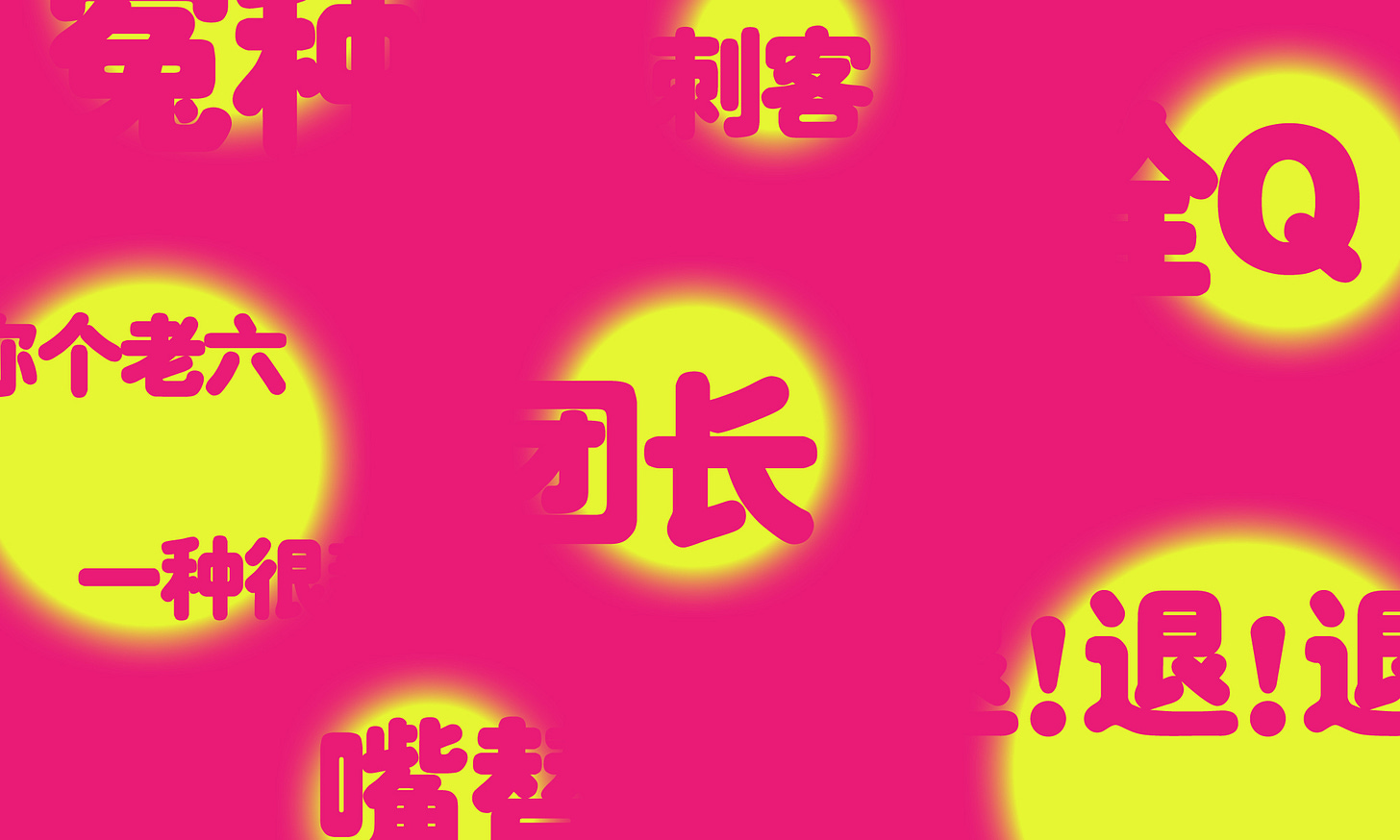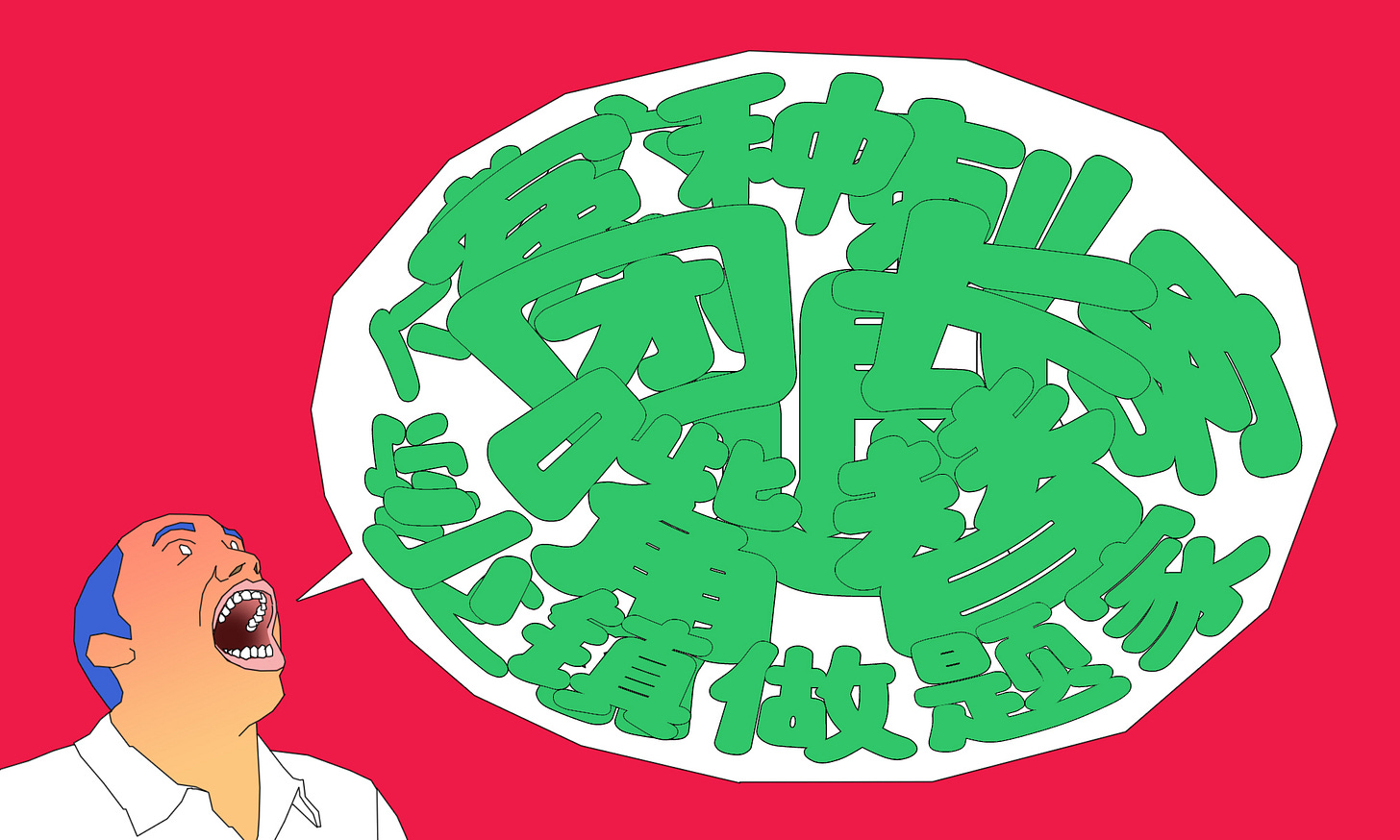Welcome to RealTime Mandarin—a multimedia resource to immerse you in the latest Chinese language trends, inspire you to practice and improve your Mandarin every week, and empower you to communicate with confidence.
Subscribe now to get the next issue straight to your inbox!
Chinese language is unique in how it absorbs and repurposes content and ideas.
This is especially true for internet language, or 网络用语 wǎngluò yòngyǔ.
Internet slang, or buzzwords are known as ‘hot terms’ (热词 rè cí), or 梗 gěng in Chinese.
A 梗 gěng is:
A joke, implied meaning, or word with specific, allusive, or ironic connotations.
笑点、伏笔,或是有特别指涉含意或讽刺意涵的东西
Originally from China’s entertainment world, a 梗 gěng is any word, phrase, meme or video that becomes a viral or ‘hot’ term on social media and the internet.
The word 梗 gěng is a misnomer. The correct character is 哏 gén. The ‘incorrect’ pronunciation began in Taiwan’s entertainment world and has since stuck and become widely used.
Every year, new expressions which started out as 梗 gěng in the internet subconsciously infiltrate modern daily language.
In 2022, hundreds of new words and phrases have come into use which did not exist last year, while some previous ‘hot’ terms have fallen away (such as YYDS).
Earlier this month, as an annual tradition, Language and Character Weekly (语言文字周报) published a top ten list of Chinese internet slang and buzzwords from 2022.
Another publication, Word Media (字媒体 zì méi tǐ), a Wechat-based blog analysing language trends in China, collated a longer list of 100 hot internet words and phrases of 2022.
So in this special issue of Slow Chinese, we’ve complied a list of 25 top internet words from 2022, from the top 10 words published by Language and Character Weekly and another 15 words from the longer list.
It’s a fascinating (ok, and a very nerdy) journey into how modern Chinese language evolves, reflects society’s changes, influences how people express themselves, and think and talk about the world around them.
The 梗 gěng in this list began life in the most unexpected places:
American movies, computer games, and pop culture, the English language more broadly, Chinglish variations of it, and Chinese dialects and regional languages;
Movies, music, TV shows, documentaries, and novels from Hong Kong, Taiwan as well as the Mainland;
Food, festivals, marketing campaigns, and sports;
Original content and comments on Douyin, Weibo and other social media platforms.
The Top 10 of 2022
1. 栓Q shuān q
thank you (sarcastic)
我真的栓Q - I'm so grateful. Thank you [not].
Background: From a Douyin blogger, Liú Tāo 刘涛, a tour guide from Guangxi, who in a video says ‘thank you’ in heavily accented English. His pronunciation sounds more like the Chinese character, 'shuān 栓', with the English letter, 'Q'. Online, it’s morphed into a way to sarcastically say ‘thank you (but not)', expressing annoyance.
Related: Other phrases with the same sarcastic tone:
我真的会谢 wǒ zhēn de huì xiè - I really thank you so very much (NOT)
我真的会蟹 wǒ zhēn de huì xiè - I really crab you (crab is same sound as thank you)
听我说谢谢你 tīng wǒ shuō xiè xiè nǐ - I say: thank you (not)
Note: The title of a song by Lǐ Xīnróng 李昕融
2. PUA
to be deceived or brainwashed
PUA自己你是高手 - You are a master at deceiving yourself [that everything’s ok]
Background: PUA is from American English phrase, ‘pick-up artist’. In Chinese internet slang, the acronym has a much broader: to be ‘brainwashed’ or ‘deceived'. It's used in the context of relationships, family, or work, with people often 'PUA-ing' themselves. We discussed this in 3 December newsletter.
Related: Other acronyms used to mean ‘deceived’ or ‘brainwashed’, normally in the passive voice (被 bèi) include:
CPU - ‘central processing unit’ = to be brainwashed. A Chinese actress mistakenly said CPU instead of PUA in an interview. Netizens liked it so it stuck.
ICU - ‘intensive care unit’ = overworked to death, a reference to 996 culture.
KTV = ‘to be fired’ (被开除了 bèi kāi chú le). It’s a nod to how live-streamer, Lǐ Gàn 李赣, invites his co-workers to KTV before firing them.
PPT - ‘powerpoint’ = pointlessly working (on endless powerpoint presentations).
3. 冤种 yuān zhǒng
someone who is taken advantage of
可那时的我,却不知道自己早已踏上了“冤种”之路 - At that time I did not realise I was already on my way to losing all my money.
Background: Originally from a north eastern dialect, this phrase is now mainstream, meaning someone who’s lost out because of their own stupidity or innocence. We last discussed it in 26 July newsletter. It could also be translated as 'unlucky fool'.
Related:
大冤种 dà yuān zhǒng - lose out in a big way, ‘big loser’
职场大冤种 zhí chǎng dà yuān zhǒng - someone who is taken advantage of in the workplace
4. 小镇做题家 xiǎo zhèn zuò tí jiā
small town test taker
看了舆论才知道,原来我们这种努力学习,以求考上更好的学校,获得更好生活的人,叫做‘小镇做题家’ - After reading the comments, I realised that people like us who work hard in order to get into a good university and have a better life are known as ‘small town test takers’.
Background: ‘Small town test taker’ is someone from the countryside who’s good at taking exams, getting into top universities, but lacks life experience. In July, the singer Jackson Yee landed a cushy job at the National Theatre of China. An article in China Newsweek suggested he was simply more talented and better qualified than ‘small town test takers’. Since then, the phrase has taken on a new meaning: people who don’t have money, fame, or network, against whom the system is rigged. We discussed this in 23 July newsletter.
5. 团长 tuán zhǎng
regimental commander; leader; pandemic group-buy leaders
那一代催生出的“团长”大多是社区周边临街的夫妻杂货店,他们的任务是负责拉群发广告,然后把街边店作为团购自提点 - Most of the 'group leaders' from that time were mom and pop grocery store oweners in the community. Their task was to publish advertisements in Wechat groups, and then use the street stores as self-collection points for group buying.
Background: Originally a military term, it’s also an informal way to say ‘boss’ or 'group leader'. During pandemic lockdowns shops were closed. Some people in local communities organised group buying (团购 tuán gòu) as a solution to help secure products for their neighbours. They became affectionately known as 团长 tuán zhǎng, ‘group buying leaders’.
6. 退!退!退!tuì tuì tuì
retreat! back off; be gone!
疫情要“退退退”,坏人也要“退退退”,霉运更要“退退退” - Pandemic: Retreat! Retreat! Retreat! Bad people: Retreat! Retreat! Retreat! Bad luck: Retreat! Retreat! Retreat!
Background: From a video clip on Douyin which went viral in May this year. It shows an intense altercation between a man who wanted to park his car, and a stall owner who was using the space to sell her wares. She wards him off, yelling repeatedly the word ‘Retreat!’ with actions reminiscent of exorcising evil spirits. In recent weeks, the meme has become popular on Douyin with people channelling the woman’s powers to exorcise the virus from China. Read more in this week’s Phrase of the Week.
7. 嘴替 zuǐ tì
mouth substitute
互联网嘴替,就是在互联网上,替我们把心里话说出来的网友们,堪称神仙网友 - Internet mouth substitutes are internet users who voice what is on our minds. They are the best online friends you can ask for.
Background: A ‘mouth substitute’ is a person who articulates what netizens want to say but can’t because they’re worried about getting it wrong, caught out by censors, or not expressing themselves well. 'Mouth substitutes' can communicate eloquently their complaints for them, having the courage to speak out and express the concerns of the many.
Related:
互联网嘴替 hù lián wǎng zuǐ tì - Internet mouth substitute
8. 一种很新的东西 yī zhǒng hěn xīn de dōng xi
a new type of thing; no idea what you mean
你在玩一种很新的东西 - This is too post-modern. (= I have no idea what you are trying say/do.)
Background: From a viral comment on Douyin earlier in the year about a song that was too busy and difficult to understand. As a meme and internet slang, it’s a sarcastic criticism expressing confusion when things over-complicated.
9. 服了你个老六 fú le nǐ ge lǎo liù
a surprise attack
这个老六我真的服了 - I can't believe you did that!
Background: From the computer game, Counter Strike: Global Offensive, a team game with five players on each side. Teams can cheat adding a sixth player in hiding, waiting for the opportune moment to launch a surprise attack. In internet language it's levelled at someone who has won unfairly, or done something underhanded.
Related:
老六 old six - a shorter version of the same phrase, the ‘old six’ is the person who does something unexpected.
10. 刺客 cì kè
assassin
“雪糕刺客”也随即在各大社交平台被网友热议 - ‘Ice-cream assassins’ have been hotly discussed by netizens on all major platforms.
Background: 刺客 cì kè means ‘assassin’. The phrase, ‘ice-cream assassin’, became popular in July this year as expensive high-end ice-creams priced at over RMB 60 were sold in the same freezers as 5-yuan ones. As a result, many consumers were caught-out, their wallets 'assassinated', when they came to pay. We first looked at this newly coined phrase in 16 July newsletter.
Related:
机票刺客 jī piào cì kè - flight ticket assassins
演出刺客 yǎn chū cì kè - show assassins
Other important phrases of 2022
Here is a further 15 internet phrases and words from this year selected from the top 100 internet buzzwords by 字媒体, divided into three categories:
Life in China
From China's entertainment world
Top memes and phrases from Douyin
Life in China
11. 科技与狠活 kē jì yǔ hěn huó
technology and filthy work
“科技与狠活”一词火了起来,成了海天味业及其他工业食品的标签 - ‘Technology and filthy work’, a term trending on social media, has become a negative label for Haitian and other food products.
Background: 'Technology and filthy work’ is a euphemism for food additives. In October this year a Douyin blogger exposed China's largest soy sauce brand for having one recipe for international markets, and another for the China market. The product for Chinese consumption was packed full of preservatives. We discussed this in 15 October newsletter.
Related:
海克斯科技 hǎi kè sī kē jì - Hex technology
12. 二舅 èr jiù
second uncle; an inspirational person who has suffered hardship
二舅治好了我的精神内耗 - My second uncle has cured my mental anxieties.
Background: ‘Second uncle’ 二舅 èr jiù was the star of a 10-minute film portraying the life of a vlogger’s disabled resilient and resourceful uncle. 'Second uncle' can now mean anyone, usually disabled, who has overcome adversity and succeeded. We explored this story in depth in the 6 August newsletter.
Related:
精神内耗 jīng shén nèi hào - mental anxieties; anxious state of mind
13. 天选打工人 tiān xuǎn dǎ gōng rén
the chosen workers















